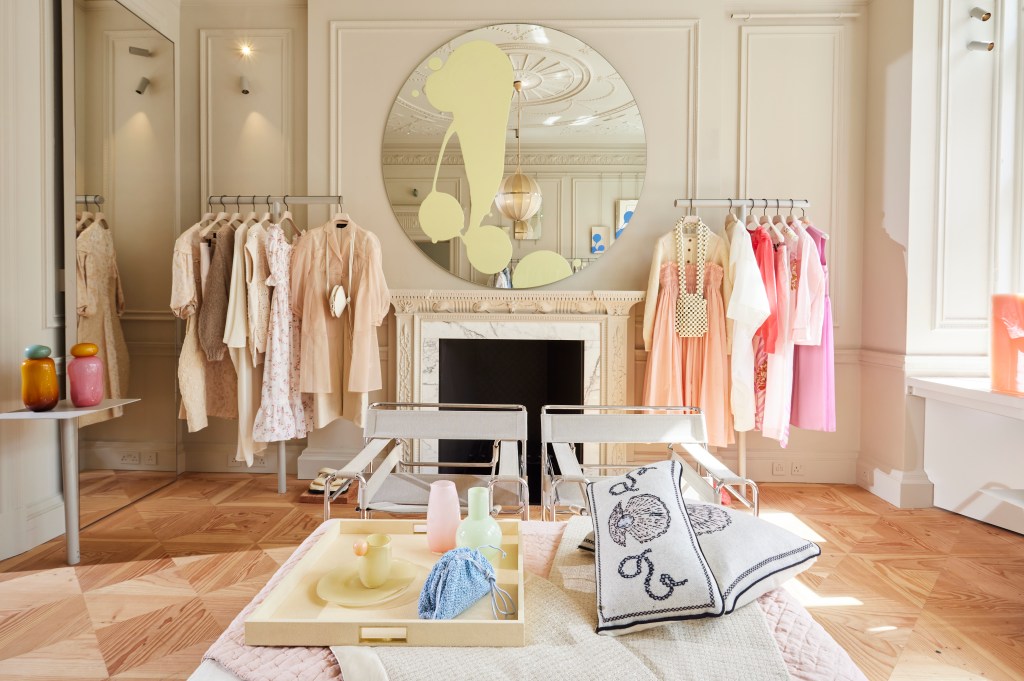LONDON — Matches, with its swanky Mayfair townhouse and VIP clients from around the world, has been sold at a knockdown price to Mike Ashley of Frasers Group in a moment of reckoning for European luxury e-commerce players.
On Wednesday, Frasers revealed it had purchased 100 percent of Matches in a deal valued at 52 million pounds, a fraction of the $1 billion price that private equity firm Apax was reported to have paid for it in 2017.
The sale came after six years of poor management by Apax, which had outbid a number of private equity investors, including Permira and KKR, for Matches in the go-go years of online retail. It purchased Matches when luxury e-commerce was still a novelty, and valuations of companies such as Net-a-porter and Farfetch were high.
Apax management never mastered the Matches business despite the fact it was working with cofounder Tom Chapman, who served for years on the board. Apax may have plowed millions into the store, but it fundamentally misunderstood the depth of resources, know-how, brand and customer relationships required to run a luxury retailer.
Matches had four chief executive officers in five years, with Apax pinning its final hopes on Nick Beighton, former CEO of Asos, to turn the loss-making company around.
Frasers said that Beighton will remain at Matches, running the company and “unlocking synergies” with Frasers, a premium fashion chain built on the ashes of the mid-market House of Fraser department stores.

The Matches sale is a cautionary tale for every private equity operator that thinks it knows best how to operate a high-end retail business or brand. But the sale is also part of a larger picture, and comes against a backdrop of difficult times for Europe’s first movers in luxury e-commerce.
Just 48 hours before Frasers made its announcement on the London Stock Exchange on Wednesday, Farfetch confirmed that it had been rescued by Coupang.
RELATED: South Korean Industry Experts Weigh In on Coupang’s Farfetch Rescue
Like Matches, Farfetch was once a fashion e-commerce darling that has seen its valuation collapse, albeit for a variety of different reasons. Farfetch, once valued at $6.2 billion, was forced into a “pre-pack” administration before a planned, $500 million rescue by Coupang earlier this week.
As a result of that deal, Yoox Net-a-porter — a loss-making company that recently broke even — will no longer be sold to Farfetch, and will remain for the moment in the Compagnie Financière Richemont stable.
Online luxury has never been a cheap or easy business, but over the past five years it has become much harder, especially for the first-movers.
There are more competitors in the space, including social media sites, while individual brands have upped their online games, building better sites and preferring “e-concessions” to wholesale in a bid to exert greater control over their stock and image.
Online players continue to grapple with the high cost of returns. According to a report this week from CBRE, returns could total as much as $82.1 billion in the U.S. alone this holiday season.
E-commerce players, which rode a tidal wave of growth during the pandemic, are now also having to compete with reopened physical stores that offer immersive experiences and face-to-face personal shopping services.
There is another dynamic at work: In a bid to compete, the e-commerce players have gone bigger and broader with their offers, often losing their specialist touch and becoming Amazon-like in scale and ambition.
More recently, those sprawling digital sellers have had to cope with a cost-of-living crisis and the loss of aspirational consumers, who are too busy worrying about their exploding mortgage payments or inflation to think about whether to buy the Gucci Marmont wallet or Max Mara Teddy Bear coat.
On top of it all, each retailer has faced its own set of challenges.

For Farfetch, it was the inability to turn a profit, a dizzyingly complex business model, and a founder and CEO in José Neves who strayed too far from the company’s original remit.
In the beginning, Farfetch was unique because it powered other brands and retailers with its tech expertise and it didn’t hold inventory. Then, all of a sudden, with the purchase of companies including Browns and New Guards Group, it was shifting inventory.
Matches had different problems, including costly distribution issues brought on by Brexit, and owners who could never fully grasp how to run a luxury retailer, or cater to a demanding, fashion-forward customer.
Apax’s only experience in fashion has been in the premium and mass market, in the early 2000s. It invested in companies including Tommy Hilfiger and PVH in the U.S., high street retailer New Look in the U.K., and Karl Lagerfeld in Europe.
There was no greater example of Apax’s misunderstanding of the Matches business than its inability to pick a CEO and stick with them.
Apax had inherited Ulric Jerome, who was doing fine when the company was sold in 2017. A tech investor and entrepreneur, Jerome was the founder of Pixmania.com, an e-commerce pioneer in Europe. Jerome and his team had successfully sold Pixmania to Dixons Retail plc when he joined Matches.
He’d worked closely with cofounders Ruth and Tom Chapman, but left soon after the sale to Apax, making way for Ajay Kavan, a high-flyer at Amazon who had launched businesses such as Amazon Fresh in the European Union and Japan.
Kavan joined shortly before the pandemic struck, and then left after a year. It was an extra-hard year for Matches which, unlike other retailers, did not thrive due to Brexit-related trading difficulties.
As reported, for the year ended Jan. 31, 2021, the company saw a 9 percent decline in revenues to 392.1 million pounds. Losses widened to 36.6 million pounds from 5.9 million pounds.
The third CEO was Paolo De Cesare, a retail veteran who had helped turn Matches sales and profits around during his short tenure. He was formerly CEO of Printemps and had served as president of the International Group of Department Stores, the largest industry association of global department stores.
At the time, Luca Solca of Bernstein said he was “very surprised to see Paolo go, as he has steered Matches on a solid relaunch course. I guess this is just the ‘nth’ demonstration — look at the Farfetch share price collapse, or the travails of YNAP — that selling luxury online through a multibrand business concept is very difficult.”
Beighton, a fast fashion expert, has been trying to turn Matches around. A tech and finance whiz, Beighton had helped take Asos from 178 million pounds in revenues to nearly 4 billion pounds by the time he left the company in October 2021.

It’s no surprise that Frasers plans to keep him on, although it’s doubtful that Matches will continue to operate in the rarefied luxury fashion sphere where relationships are all-important and managers operate like she-wolves nurturing and protecting a brand’s image.
Beighton is hopeful.
“Since I joined Matches last year, we have made good progress, sharpening our brand and product curation and improving the day-to-day operations of the business. As a result, we have seen a resilient trading performance despite the challenging economic backdrop,” he said.
“Being part of Frasers, with their utter commitment to luxury, will give this business access to greater scale, best-in-class retail expertise, and the financial stability it needs to more effectively deliver for our brand partners and our customers,” Beighton added in a statement.
The turnaround job will be a big one. In the fiscal year ended on Jan. 31, 2023, Matches’ sales dipped 1.7 percent to 380.1 million pounds, while losses widened to 70.9 million pounds from 39.8 million pounds.
Frasers owns retail brands including Sports Direct, Flannels, Agent Provocateur, and Jack Wills, some of which were purchased out of administration.

Michael Murray, CEO of Frasers, said Matches “has always been a leader in online luxury retail and has incredible relationships with its brand partners. This acquisition will strengthen Frasers’ luxury offering, further deepening our relationships and accelerating our mission to provide consumers with access to the world’s best brands.”
Murray added: “While the global luxury environment is softer, we are confident that, by leveraging our industry-leading ecosystem, we will unlock synergies and drive profitable growth for Matches.”
Ashley may no longer hold a big title at the group, but he remains a shareholder and adviser to his CEO son-in-law Murray.
Known as the Grim Reaper of the high street, Ashley specializes in buying stakes in distressed companies, or brands that sell through his retail chains, often at a steep discount. Ironically, even as Frasers was in talks to buy Matches, Ashley is said to also have been in discussions to purchase Browns, another London designer retailer, from the struggling Farfetch. It is unclear whether those discussion are ongoing but Coupang is expected to sell some of the Farfetch assets.
Most of the products that Frasers sells are in the premium or mass segments, although Ashley and his team have been keen to move upmarket. Buying Matches was a coup for a company like Frasers, but it remains to be seen which brands will remain at the store, and which will leave.
They might not have many luxury e-commerce sites to run to. Yoox Net-a-porter, the first mover in the space, was supposed to be sold to, and revitalized by, Farfetch. But that deal is now off following the Farfetch sale to Coupang.
Earlier this week Richemont said it was considering its options with regard to YNAP, and its plans to create a shared, “neutral” platform for luxury brands, with no single majority owner.
Richemont said it plans to hold on to YNAP and will “reevaluate options … to harness its strengths and potential under new stewardship.”
The luxury giant, owner of brands including Cartier and Chloé, has not shed any more light on its plans for YNAP, which it was eager to sell for two reasons.
Richemont’s founder and chairman Johann Rupert is a brand builder, not an online operator, and was eager to hand the YNAP business over to Neves. Rupert was also sincerely committed to creating a shared platform for luxury brands.
Last year, Rupert said his deal with Farfetch to create a neutral platform was going to be “transformative for all of luxury, and not for a select few. It will transform big and small companies throughout Europe” by allowing them to set up shop online with help from tech-savvy Farfetch.
With that deal having fizzled, and e-commerce players’ fast losing value, it may be time for Rupert to reboot his dream.


